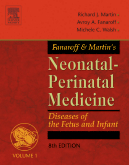|
|
|
| |
 |
|
|

|
 推薦指數:
推薦指數:





|
|
- 內容介紹
|
Fanaroff and Martin's Neonatal-Perinatal Medicine, 8th Edition - Diseases of the Fetus and Infant, 2-Volume Set
By Richard J. Martin, MB, FRACP, Avroy A. Fanaroff, MB, FRCP (Edinburgh), FRCP, CH and Michele C. Walsh, MD, MS
2036 pages, 842 ills,
Trim size 8 1/2 X 10 7/8 in,
Copyright 2006
Description
Exhaustively updated to reflect all of the recent sweeping developments in neonatal-perinatal medicine, this 2-volume reference will continue to set the standard. Representing a wide range of subspecialties, a team of world renowned contributors offers sound practical advice based upon the best available evidence. Volume One focuses on the field of neonatal-perinatal medicine, pregnancy disorders and their impact on the fetus, and delivery room care. Volume Two concentrates on development and disorders of organ systems.
With more than 120 additional contributing experts.
Key Features
Includes over 800 illustrations which depict disorders in the clinical setting and explain complex information.
Features a dual focus on neonatology and perinatology for comprehensive guidance in treating patients.
New to this Edition
Offers several new chapters including Legal Issues in Neonatal-Perinatal Medicine • Neonatology in Developing Countries • Role of Positive Pressure Ventilation in Neonatal Resuscitation • Chest Compressions, Medications, and Special Problems • Environmental Influences of the Developing Neonate • and Hypoxic-Ischemic Encephalopathy.
Presents the fresh perspectives of many new contributors—including new Associate Editor Michele Walsh.
Features a more consistent organization in the organ system chapters that allows for more user-friendly access to the material, plus a redesigned look throughout the book.
Includes a CD-ROM that offers convenient access to the text’s numerous illustrations and the ability to download to PowerPoint®.
Facilitates quick access to specific guidance through indexing in both volumes.
Table of Contents
I. THE FIELD OF NEONATAL-PERINATAL MEDICINE
1. From infant hatcheries to intensive care: Some highlights of the century of neonatal medicine
2. Epidemiology and Perinatal services
One: Epidemiology
Two: Perinatal Services
3. Ethics in perinatal and neonatal medicine
4. Legal issues in neonatal-perinatal medicine
5. Principles of Neonatal Care
One: Evaluating and improving the quality of neonatal care
Two. Practicing evidence-based neonatal-perinatal medicine
6. Neonatology in developing countries
II. THE FETUS
7. Genetic aspects of perinatal disease and prenatal diagnosis
8. Perinatal ultrasound
9. Estimation of Fetal Well-Being
One: Evaluation of the antepartum fetus
Two: Evaluation of the intrapartum fetus
10. Pharmacologic Intervention
One: Developmental pharmacology
Two: Pharmacologic treatment of the fetus
11. Surgical treatment of the fetus
12. Occupational and environmental risks to the fetus
III. PREGNANCY DISORDERS AND THEIR INPACT ON THE FETUS
13. Intrauterine growth restriction
14. Hypertensive disorders of pregnancy
15. Pregnancy complicated by diabetes mellitus
16. Obstetric management of prematurity
17. Fetal effects of autoimmune disease
18. Obstetric management of multiple gestation
19. Postterm pregnancy
20. Erythroblastosis fetalis
21. Amniotic fluid and non-immune hydrops fetalis
22. Perinatal infections
23. Placental pathology
IV. THE DELIVERY ROOM
24. Anaesthesia for labor and delivery
25. Neonatal Resuscitation: An Evidence-Based Approach
One: Overview and initial management
Two: Role of positive pressure ventilation in neonatal resuscitation
Three: Oxygen therapy
Four: Chest Compressions, medications, and special problems
26. Physical examination and basic care of the newborn
27. Birth injuries
28. Congenital anomalies
V. PROVISIONS FOR NEONATAL CARE
29. Physical Environment
One: The thermal environment
Two: Environmental influences of the developing neonate
30. Biomedical engineering aspects of neonatal monitoring
31. Anesthesia in the neonate
32. Care of the mother, father, and infant
33. Nutrition and Metabolism in the High-Risk Neonate
One: Enteral feeding
Two: Parenteral Nutrition
34. Fluids, Electrolytes, and Acid-Base Homeostasis
35. Diagnostic imaging
36. Infants of addicted mothers
VI. DEVELOPMENT AND DISORDERS OF ORGAN SYSTEMS
37. The Immune System
One: Developmental immunology
Two: Postnatal bacterial infections
Three: Fungal and protozoal infections
Four: Viral infections
38. The Central Nervous System
One: Normal and abnormal brain development
Two: White matter injury
Three: Intracranial hemorrhage and vascular lesions
Four: Hypoxic-ischemic encephalopathy
1. Pathophysiology
2. Assessment tools
3. Management
Five: Seizures in neonates
Six: Hypotonia and neuromuscular disease
Seven: Disorders in head size and shape
39. Follow-up for high-risk neonates
40. Hearing loss in the newborn infant
41. Neurobehavioral development of the preterm infant
42. The respiratory system
One: Lung development and maturation
Two: Assessment of pulmonary function
Three: Respiratory distress syndrome and its management
Four: Assisted ventilation and complications of respiratory distress
Five: Repiratory disorders in preterm and term infants
Six: Upper airway lesions
Seven: Neonatal chronic lung disease
Eight: Cardiorespiratory failure, adjuvant therapies, ECMO, and inhaled NO
43. The cardiovascular system
One: Cardiac embryology
Two: Causes and associations
Three: Fetal cardiac physiology and fetal cardiovascular assessment
Four: Principles of neonatal cardiovascular hemodynamics
Five: Approach to the neonate with cardiovascular disease
Six: Congenital defects
Seven: Cardiovascular problems of the neonate
Eight: Neonatal arrhythmias
Nine: Principles of medical and surgical management, including interventional catheterization
44. The blood and hematopoietic system
One: Hematologic problems in the fetus and neonate
Two: Blood component therapy for the neonate
45. The gastrointestinal tract
One: Development
Two: Upper gastrointestinal disorders
Three: Disorders of digestion
Four: Selected anomalies and intestinal obstruction
Five: Necrotizing enterocolitis
46. Neonatal jaundice and liver disease
47. Metabolic and endocrine disorders
One: Disorders of carbohydrate metabolism
Two: Disorders of calcium, phosphorus, and magnesium metabolism
Three: Thyroid disorders
Four: Abnormalities of sexual differentiation
48. Inborn errors of metabolism
49. Kidney and urinary tract
50. The skin
51. The eye
One: Diagnosis and evaluation
Two: Neonatal eye disease
Three: Retinopathy of prematurity
52. Neonatal orthopedics
One: Musculoskeletal disorders
Two: Bone and joint infections
Three: Congenital abnormalities of the upper and lower extremities and spine
Appendices
A. Therapeutic Agents
B. Tables of Normal Values
C. Schedule for Immunization of Preterm Infants
|
|
|

